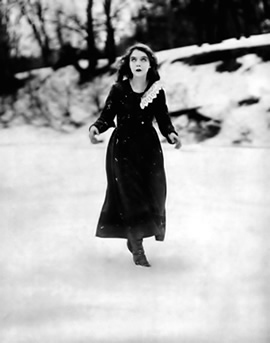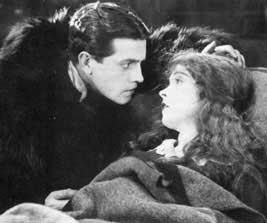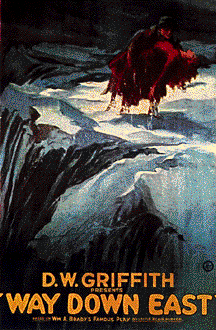
 |
|
|
|
Before the videocassette revolution UCLA's film school screened many of the same miserable incomplete 16mm prints of film "classics" that everybody else had to put up with. But thanks to the new UCLA Film Archive the school had access to some unique resources -- the studio film libraries of Fox and Paramount, collectors like David Bradley, and special contacts our instructors didn't divulge. Associate professor Bob Epstein screened several Griffith classics in really marvelous condition, including 1920's Way Down East. For many of us, exposure to silent movies was limited to random clips on TV's Fractured Flickers; on the large Melnitz screen we could appreciate the artistry and fine-quality cinematography of titles like The Docks of New York and Orphans of the Storm. With a real organ accompaniment (sometimes by retired silent movie musicians), Way Down East took our heads off. Its story was surprisingly hard-hitting, and its subject matter was definitely too raw for the later Production Code. Although the film's peripheral comedy was performed in an antiquated "hayseed" acting style, there was nothing at all dated about the main drama. Lillian Gish is simply amazing in this picture, communicating a broad range of emotions without words. The heart-tugs that gripped the student audience were authentic, as was the excitement of an action climax involving extremely risky stuntwork - reportedly performed by the main players. 
The exemplary extras on Kino's disc of Way Down East explain that Griffith adapted his storyline from two plays, plus an ending borrowed from Uncle Tom's Cabin. Sweet country girl Anna Moore (Lillian Gish) accepts an invitation to stay with some rich relatives in the city. Inexperienced but not stupid, Anna doesn't pick up on her cousins' deprecatory remarks and attitude. The society woman who should be looking out for Anna doesn't bother to educate her about the dangers of city men. She then exits on a long trip, leaving Anna on her own. The smooth, handsome Lennox Sanderson amuses himself by seducing women, and sees Anna as an easy conquest. Unable to bed her with his usual tricks, he hires some cohorts to help him pull off a fake marriage. Sanderson leaves almost immediately after the honeymoon night. When Anna turns up pregnant, he abandons her. The penniless Anna must sneak off to a boarding house to have her baby. It becomes sick and dies, and when the cruel landlady discovers that Anna has no husband, she is turned out of her room. By luck Anna is hired to help out in the kitchen of Squire Bartlett (Burr McIntosh), but in the belief that she's 'damaged goods' she avoids the attention of Bartlett's handsome, virtuous son David (Richard Barthelmess). It turns out that Lennox Sanderson is a friend of the family. He insists that Anna leave, as she might cause him embarrassment. Then the news about Anna's baby reaches the local gossips. The rigidly moral Squire orders Anna out into the snow right in front of his dinner guests -- including Sanderson. Only then does Anna decide to make a stand, and call out the man responsible for ruining her life. 
Way Down East is a deceptive show -- it establishes a foundation of light drama in a bucolic setting, with comic characters like an old maid and a rube called Hi Holler (Edgar Nelson). It then launches into a serious, heart-rending story of innocence spoiled and honor outraged. It's not a formal morality play. The characters may be types but the figures at the center of the drama are fully three-dimensional. Lennox Sanderson is not a moustache-twirling fiend, just a spoiled and selfish rake determined to have his way. Griffith betrays his underdog sentiments with a title card that reads: "Sanderson, like others of his class, will find a way to get what he wants." The despicable behavior is simply a means to an end. As far as he's concerned, her problems with his child are an inconvenience. With his social position and the double standard on his side, he can simply tell Anna to go away. D.W. Griffith honored an antiquated vision of innocent womanhood while putting his demure heroines through hell. The waif in Broken Blossoms has little choice but to be beaten to death, and the twins in Orphans of the Storm must struggle to prevail over a series of threatening situations. Lillian Gish's Anna suffers the dreaded Fate Worse than Death, followed by an even worse tragedy. She then must regroup to build up some self-worth in the face of universal disapproval. Depending on who tells what about her sad story, Anna could and does find herself cast into the freezing night. 
Lillian Gish is a marvel and her acting is transcendent. Griffith lets the camera play on long scenes of Lillian simply letting waves of emotion wash over her face. It all looks honest and real. The tiny Gish is obviously vulnerable and sympathetic yet some additional glow in her personality disarms us completely. An image from a film made in 1920 has the power to grip our emotions 91 years later. 2012 will be the centenary of Lillian Gish's first appearance in a movie. Viewers familiar with the later movies of actor Richard Barthelmess will know that he played a variety of good but broken men: a member of "the lost generation" in the pre-code The Last Flight, a dishonored pilot married to Rita Hayworth in Howard Hawks' Only Angels Have Wings. In Way Down East Barthelmess is still young and unmarked, not yet disillusioned. His David is a thoughtful, nice guy, just the kind of youngster we want Anna to end up with. Way Down East actually has a scene where a doctor tells a mother that her baby is dead. Twenty years later the Production Code forced a character in John Ford's The Grapes of Wrath to be written out of the movie. Griffith and his scenarists build to the stunning accusation-expulsion scene at the big dinner, where the meek Anna finally vents her grief, anger and outrage at her oppressor. And then Griffith saves the best for last. 
Most of us have seen excerpts of Way Down East's finale on the ice. By this time the movie has us so firmly in its spell that we simply accept what we see. The cast-out Anna stumbles through a blizzard and collapses on an ice floe in the process of breaking up. She drifts toward an icy winter waterfall, with one hand and her long hair in the icy water. Griffith puts the menace of the ice floe in the way of true love, and the action climax reduces us all to breathless wonder. The river is real, the ice is real, and we're told (by reliable witnesses, including Gish herself) that it is her we see lying on the ice, freezing while trying to "act" unconscious. Barthelmess really does hop from one floating ice block to the next. Some sections are unstable and we see him almost slip. The cutaways to a roaring falls are clearly not a good match, but the action with the principals is real, right down to the last few moments. Anna draws near the edge, and David still has a ways to go to reach her... 
It's basic filmmaking - images and emotion. D.W. Griffith's Way Down East is enough to restore one's faith in the movies as an art form, one that just might last for a while. Kino Classics' Blu-ray of Way Down East is an excellent HD transfer of a careful restoration by the Museum of Modern Art. The few instances where footage is missing (sometimes just a shot or two) are covered in explanatory titles. The restoration uses the original color tints of the preserved 35mm footage. In HD, many shots are much clearer than we expect them to be. The added stability and detail of Blu-ray gives us a front row seat for Lillian Gish's terrific performance. The Mont Alto Motion Picture Orchestra provides the music, in DTS-HD Master Audio 5.1 and also in straight stereo. Galleries include images and text from the film's original souvenir program (one is used for the package illustration), some text notes on the original play and photos of a stage production, and a film clip from an early Edison version of Uncle Tom's Cabin that inspired Griffith to borrow the idea for his improved climax. Kino's disc producer is Bret Wood.
On a scale of Excellent, Good, Fair, and Poor,
Way Down East Blu-ray rates:
Reviews on the Savant main site have additional credits information and are often updated and annotated with reader input and graphics. Also, don't forget the 2011 Savant Wish List. T'was Ever Thus.
Review Staff | About DVD Talk | Newsletter Subscribe | Join DVD Talk Forum |
| ||||||||||||||||||